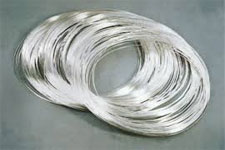CX - Rule 18 accords rebate of duties paid on goods that are exported & do not distinguish between exempted goods and dutiable goods - lower authorities have erred in adopting approach which is redolent of opportunism: CESTAT
By TIOL News Service
MUMBAI, JAN 03, 2017: IN respect of duty paid on goods that were exported, rebate was sanctioned. This was later sought to be recovered and the rebate claim for the later period was proposed to be rejected.
The case against assessee was that the goods cleared by them for export and domestic sale was ‘silver alloy wire' classifiable under 7107.70 and, hence, subject to ‘nil' rate of duty instead of the claimed classification of 8535 as ‘silver alloy contacts' with duty liability of 16%.
Revenue alleges that the assessee had been classifying the goods under 7101.70 and changed the same to a dutiable head in order to encash the accumulated CENVAT credit availed on inputs used in manufacture. Moreover, the ‘contacts' are in pieces whereas it appears from the documents pertaining to the domestic sale that goods were manufactured in running length and hence the goods is ‘wire' and not ‘contacts'. So also, being exempt goods, since common cenvatted inputs were used, amount @8% of value of exempted goods is recoverable.
The lower authorities upheld the allegations leveled and, therefore, the appellant is before the CESTAT.
It is submitted that the heading 7101.70 covers articles of silver whereas the alternative heading 8535 refers to ‘electrical apparatus for switching or protecting circuits or making connection to or in circuits'. Reliance is placed on the decisions in Repro India Ltd - 2007-TIOL-795-HC-MUM-CX and Cipla Ltd - 2014-TIOL-2080-HC-MUM-CX.
The AR reiterated the contents of the impugned order.
The Bench observed -
++ We find that rule 5 of CENVAT Credit Rules, 2002 applies to inputs used in final products cleared for export and that rule 18 of Central Excise Rules, 2002 accords rebate of duties paid on goods that are exported. The rebate under this rule is allowable as along as goods are excisable or duty has been paid on materials used in processing of such goods. We find no reason to surmise that these rules distinguish between exempted goods and dutiable goods. They refer to final products and to excisable goods respectively. The decisions of Hon'ble High Court of Bombay cited supra resolves the dispute in favour of the appellant.
++ The assessee has, according to its knowledge, experience and wisdom, chosen one classification over the other. With the consequent discharge of duty liability on clearance to a domestic consumer, it is not open to Revenue to insist that tax payable on exempt goods manufactured using inputs that are separately not identifiable with such exempt goods, and on which credit has been availed, is required to be discharged or that the benefits and privileges that may arise therefrom, in the form of rebate or refund, can be denied. That would be an opportunistic decision conditioned by rates of duty instead of consistency in tax administration based on sound and cogent principles. The lower authorities have erred in adopting the approach which is redolent of opportunism.
++ The appellant cannot be faulted for contending that a finding of duty not being leviable carries with it the concomitant responsibility to reverse the debit in the CENVAT credit account which would then render the assessee eligible to refund of input credit.
++ It is the stated doctrine in tax administration that domestic taxes are not exported with goods. Legislation carves out special provisions in taxing statutes for ensuring that such anathema is eliminated. The failure on the part of the lower authorities to perceive the intent of provision of rule 18 of Central Excise Rules, 2002, by digressing to the issue of payment of duty without the legal compulsion to do, appears to have blindsided them into suspicion of the motives for payment of such duty to the exclusion of the larger issue, viz, burdening the export value with domestic taxes.
The impugned orders were set aside and the appeals allowed.
(See 2017-TIOL-18-CESTAT-MUM)

















